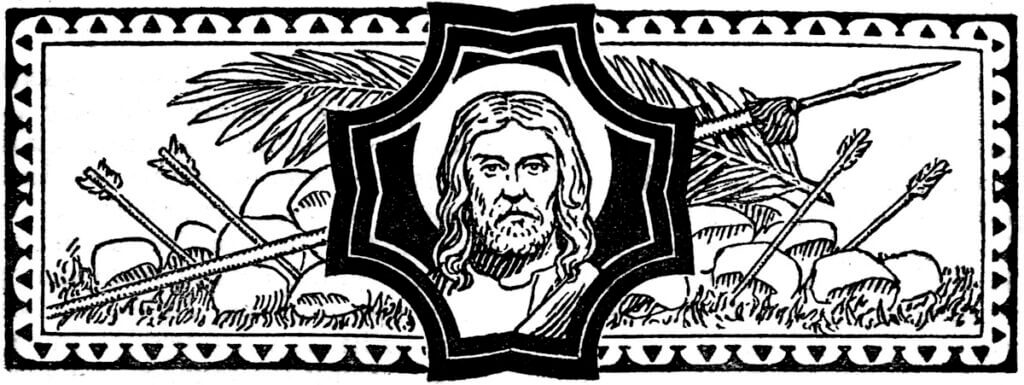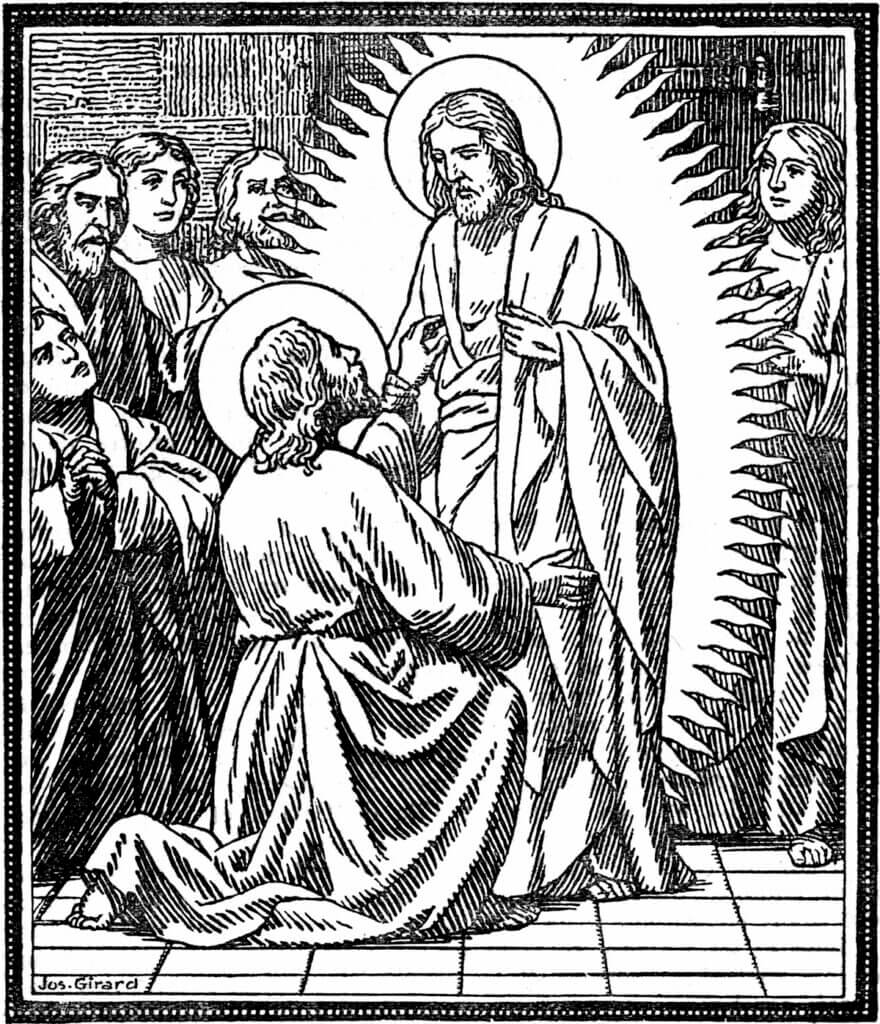
Saint Thomas, apostle
"Apostle and Martyr (1st century).
Feast on December 21.
When Our Lord, after spending thirty years in the humility of an obscure life, inaugurated His public mission and began to reveal to the world the mysteries of the kingdom of heaven, He chose, while passing through the towns of Palestine, disciples who accompanied Him in His apostolic journeys. Twelve of them were more intimately associated with His ministry: He instructed them with predilection, sent them to preach in His name, made them His messengers, friends, and apostles. Among these privileged ones who received more closely the sublime teachings of the Master and the secrets of His loving heart was Saint Thomas.
According to ancient documents, his real name was Judas; and it is probably because of the very common use of this name among the Jews that, to distinguish him from his namesakes, he was designated by the nickname Thomas, meaning twin, like the Greek name Didymus by which the evangelist Saint John also refers to him. According to tradition, he was born in Antioch, and apocryphal writings recount that he had a twin sister named Lydia. But one must turn to the Gospel to find episodes of undeniable authenticity from the life of Saint Thomas.
Courageous fidelity to the Master.
At the time he heard the call of Jesus, Thomas must have led, like most other apostles, a humble existence as a fisherman in Galilee. Later, indeed, after the Resurrection of Christ, we find him among the disciples who, having resumed their former trade, cast their nets into the waters of the Sea of Galilee and, favored by an appearance of the resurrected Savior, obtained, by His word, a miraculous catch of fish. His character is revealed in three facts related by Saint John.
Firstly, there is an episode where the apostle shows himself generously devoted to the Master and pushes fidelity to the extent of being willing to face death. Our Lord had publicly taught the Jews that He was equal to the Father and God like Him, and His listeners had gathered stones to stone Him as a blasphemer; but He had escaped their fury, for the time to suffer for the Redemption of the world had not yet come. When this hour approached, He said to His disciples, 'Let us go back to Judea.' These words frightened them. 'Master,' they exclaimed, 'just a few days ago, the Jews wanted to stone you, and you want to return to that place!' They feared, in a dual sense of love and fear, the mistreatment that was reserved for their Master and for themselves. It was then that Thomas, overcoming all fear, encouraged his companions to remain faithful to Jesus unto death. He said these courageous words to them: 'Let us also go, that we may die with him.' In this circumstance, as noted by Saint Vincent Ferrer, he showed more charity than the other apostles, for there is no greater love than to give one's life.
Love for truth.
Resolved to follow Christ even to the path of torment, Thomas was, beyond doubt, very attentive to divine teachings, and he wanted to understand them well. Little inclined to believe without understanding and wary of any assertion not supported by solid evidence, he loved truth and clung to it ardently as soon as it imposed itself on his mind. Far from being naively credulous, he reasoned about what he heard and yielded only to a doctrine that was clear and certain. Two episodes highlight this attitude of soul.
Let us transport ourselves to the Upper Room, where the Lord partook of His last supper with His disciples, this Paschal meal where, after giving them His Body and Blood through the institution of the Holy Eucharist, He imparted to them the most sublime teachings that have ever struck human ears. As He was about to offer Himself up to death, He comforted His disciples who were distressed at the thought of the imminent separation by announcing to them that He would prepare a place for them in His Father's house, saying to them: 'And if I go and prepare a place for you, I will come again and will take you to myself, that where I am you may be also. And you know the way where I am going.' But Thomas interrupted Him: 'Lord, we do not know where you are going; how can we know the way?' By these words, he humbly confessed that the Master's doctrine concerning the end of His mission had exceeded the scope of his understanding, and he asked to be better instructed. And Jesus answered him with these words that magnificently underscore His redemptive work: 'I am the Way, the Truth, and the Life; no one comes to the Father except through me...' No doubt, no apostle listened then with more attention to the doctrine of truth and life that the Savior continued to expound.
The hour of doubt and the hour of faith.
Because he loved truth, the apostle Thomas wanted it pure; he guarded against the illusion and imagination that distort it. In him, to the point of excess, there was a kind of intellectual prudence that prevented him from believing every human testimony that did not offer undeniable proofs. This becomes apparent in the well-known Gospel episode where he underwent a moment of doubt, even disbelief, before the exquisite hour of reassured and unwavering faith.
Jesus Christ, after His Resurrection, appeared to the disciples who, for fear of the Jews, had locked themselves in the Upper Room. Thomas, at that moment, was not with them. When he returned, they surrounded him and said, 'We have seen the Lord.' However surprising the fact of the glorious Resurrection of the Savior might have been, the apostle should have bowed before the unanimous affirmation of the disciples. He did not: he feared that they had been victims of an illusion. 'Unless I see in His hands the mark of the nails, and place my finger into the mark of the nails, and place my hand into His side, I will never believe.'
Eight days later, while the disciples were still gathered in the Upper Room and Thomas was among them, Jesus appeared to them again, saying, 'Peace be with you!' Then, addressing Thomas and showing him His wounds, He said, 'Put your finger here, and see my hands; and put out your hand, and place it in my side. Do not disbelieve, but believe.' Did the apostle touch the Savior's scars? The sacred text does not say, and one can believe that it was enough for Thomas to hear the testimony given by Jesus to the reality of His Resurrection to reject all doubt and disbelief and to express his faith, henceforth luminous and fervent, in this cry full of respect and love: 'My Lord and my God!' Jesus replied: 'Have you believed because you have seen me? Blessed are those who have not seen and yet have believed!' For any reproach, He opposed to the late submission of His apostle the merit and the happiness of souls who believe in Him without requiring to see Him.
The Fathers of the Church delighted in showing how the momentary disbelief of the disciple turned to the advantage of Christianity, by removing all reason to doubt the Resurrection, and consequently the divinity of Jesus. Saint Gregory the Great writes: 'The disbelief of Saint Thomas has done more to strengthen our faith than the faith of the disciples who believed.'
Saint Thomas exclaimed: 'My Lord and my God!'
The farewell of the Savior to His disciples had a profound echo in the heart of Saint Thomas, who, during the last days of the life of his Master, must have retained a vivid memory of the celestial teachings that the Redeemer gave before His Passion and His ascension to the Father. These teachings resounded with particular strength during the mystical discourse pronounced at the Last Supper and the mandate of love which Jesus had given His apostles, saying: 'This is my commandment, that you love one another as I have loved you.' In His prayer to the Father, He manifested the sovereign will that all His followers 'may be one, even as We are one.' Then, He predicted His approaching Passion and His triumph over death, promising to send the Holy Spirit who, descending on the apostles and making them His courageous witnesses, would enable them to preach His doctrine with the force of miracles.
These words must have resounded powerfully in the heart of Saint Thomas when he saw himself invested with the mission of preaching the Gospel of salvation. And, to be the more docile to the inspirations of the Holy Spirit, the apostle retired into a profound solitude to pray, asking the divine Master for His assistance and the grace to fulfill well the work confided to him.
The apostolic missions and the martyrdom of Saint Thomas.
According to an ancient tradition accepted by the Church, Thomas left Judea and went to preach the Gospel in Parthia, Media, Persia, and finally in India, where the majority of authors place the term of his apostolic labors. What he had long ardently desired, and perhaps feared, became a reality: he was to bear the most beautiful title granted to a mortal, that of martyr, a title that he was going to seal with his blood, after the example of his Divine Master.
In India, the apostle preached the Gospel with apostolic fervor, confirming his words with miracles that touched the souls and hearts of his hearers. He converted to Christ not only simple people but also the children of kings, nobles, and women of the highest rank. He founded Christian communities, ordained priests and bishops, and entrusted to the faithful the deposit of the faith and the Holy Scriptures, which he had translated into the language of the country.
But among those he converted, there were enemies who, full of hatred, sought to take his life. It was in the year 72, while Saint Thomas, during a Eucharistic celebration, was absorbed in prayer, that the assassins arrived. They fell upon him and, brandishing their weapons, inflicted several blows on him, so that, according to tradition, the apostle fell to the ground and gave his soul to God. His death was the echo of his life: a life wholly consecrated to the service of the Divine Master, a life of love for truth, a life of apostolic zeal. His last words, uttered with fervor and carried to the heart of God, were the same as his first words pronounced under the touch of grace: 'My Lord and my God!'
The disciples of the apostle collected his remains and buried them with great veneration in the city of Calamina, in India, where a magnificent basilica was erected in his honor. A church was also dedicated to him in Edessa, where the Christians of Syria venerated the relics of Saint Thomas.
The cult of Saint Thomas spread quickly in the East and later in the West. Pope Urban VIII extended the feast of the Apostle Thomas to the entire Church on December 21. The Greeks, on the contrary, celebrated the feast of Saint Thomas on October 6, which is still done today by the Coptic Church. The church of Saint Thomas on the Palatine Hill in Rome is an indication of the cult that the West rendered to the apostle.
The apostle of Christ offers us several lessons: fidelity to the Master even to death, love for truth, and the courage to face doubt to attain a faith that enlightens the soul and vivifies it with the fullness of divine life."


கருத்துகள் இல்லை:
கருத்துரையிடுக